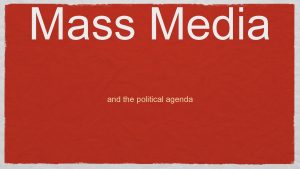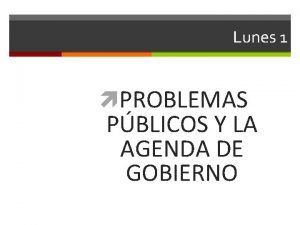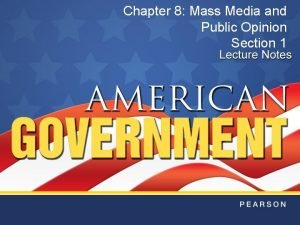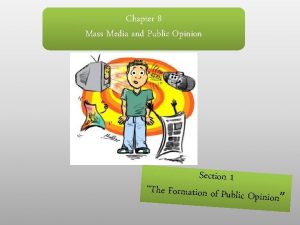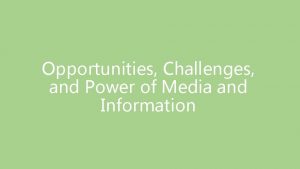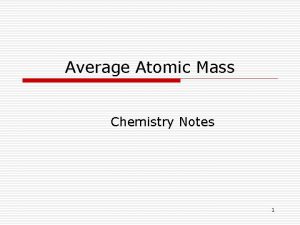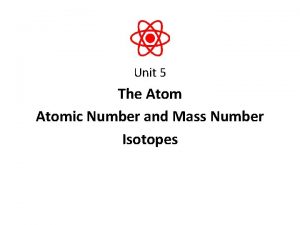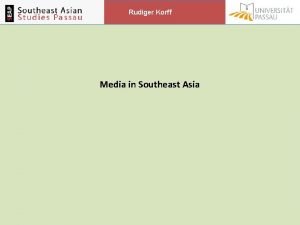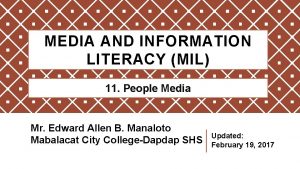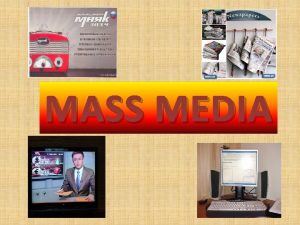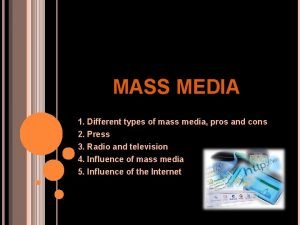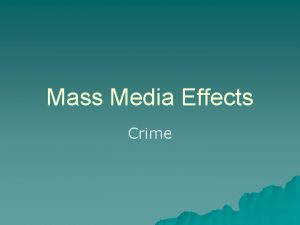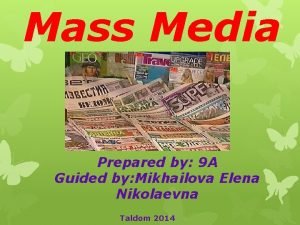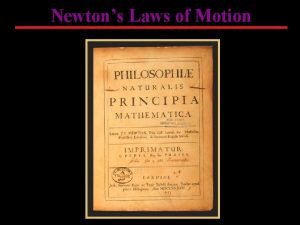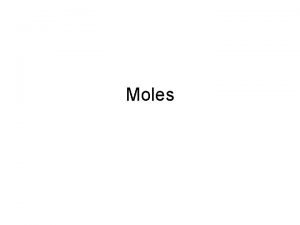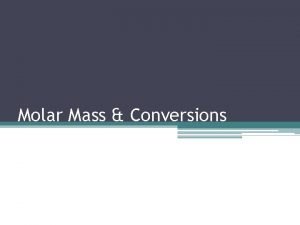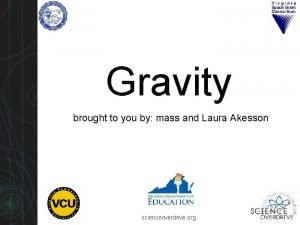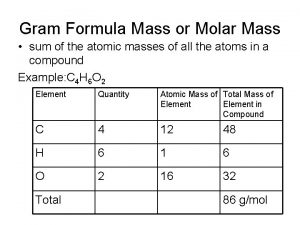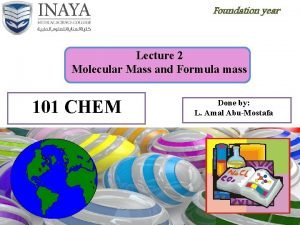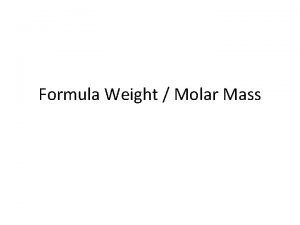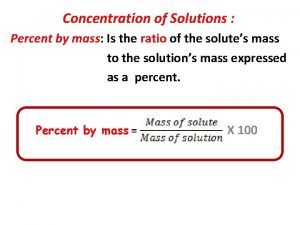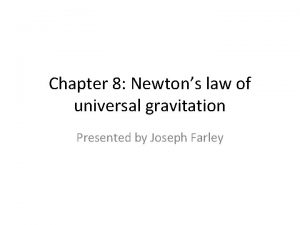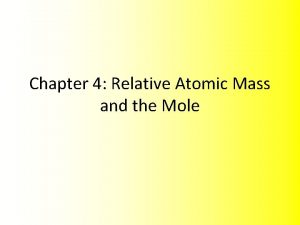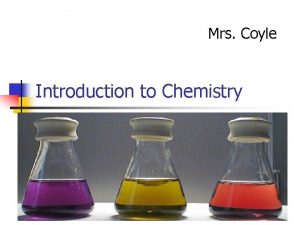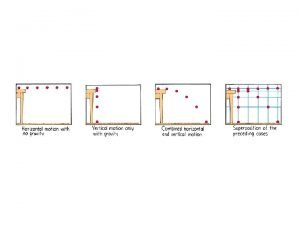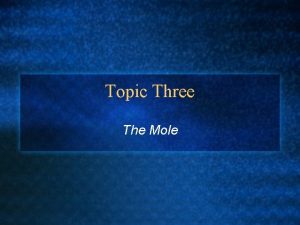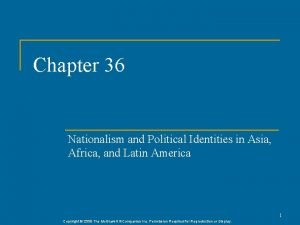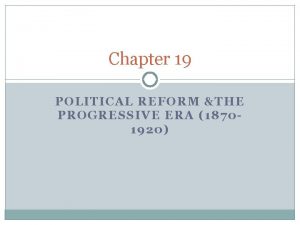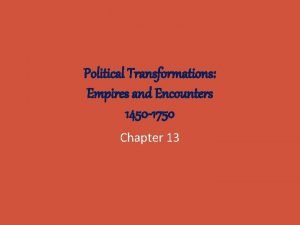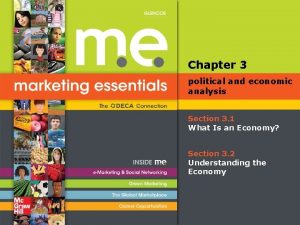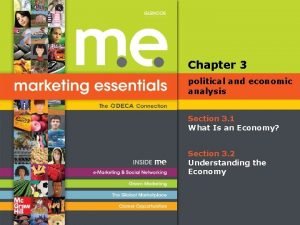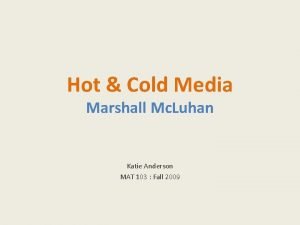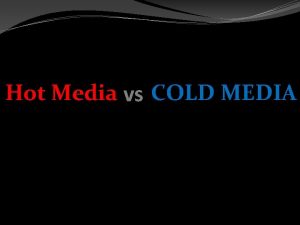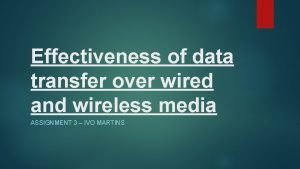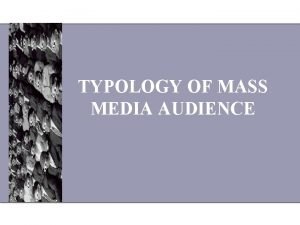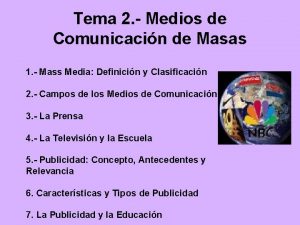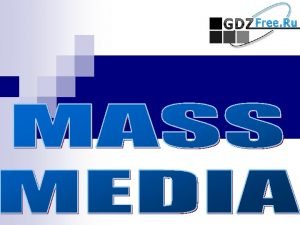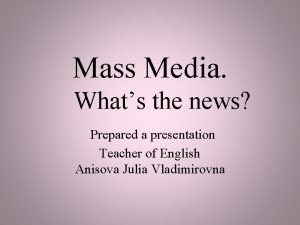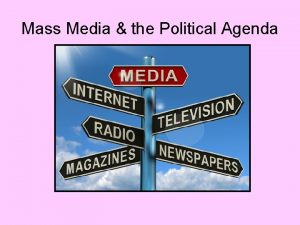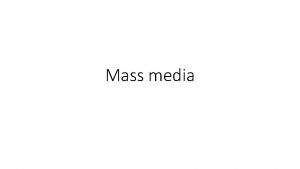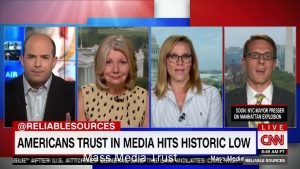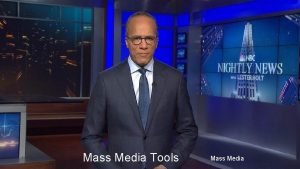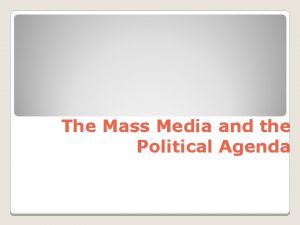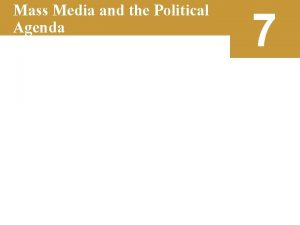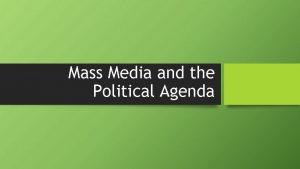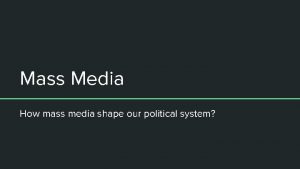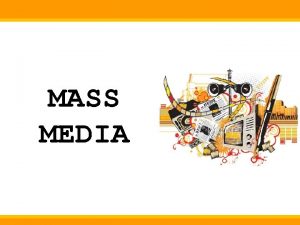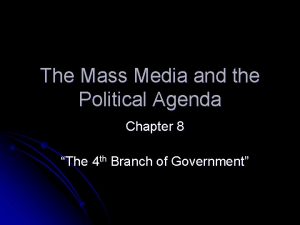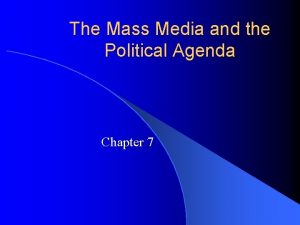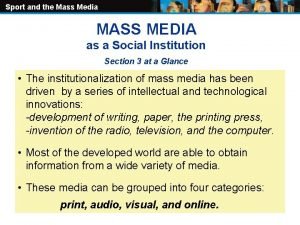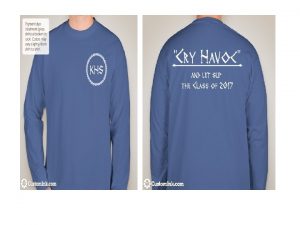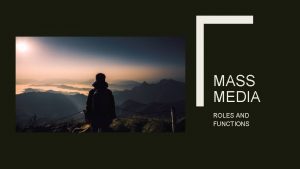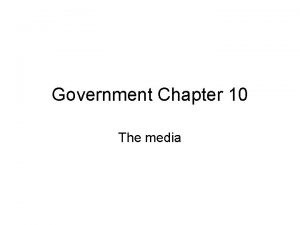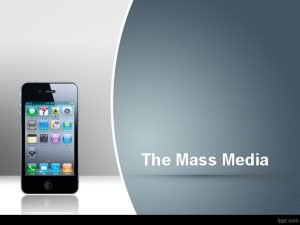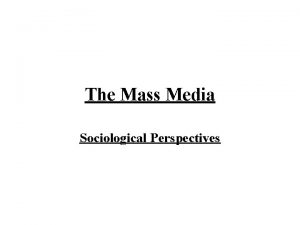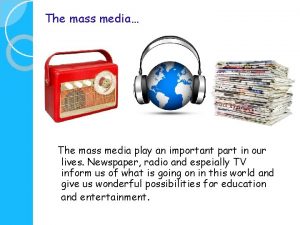The Mass Media and the Political Agenda Chapter























































- Slides: 55

The Mass Media and the Political Agenda Chapter 7


The Media The Fourth Estate, the Fourth Branch of government l Edmund Burke said “There were Three Estates in Parliament; but, in the Reporters' Gallery yonder, there sat a Fourth Estate more important far than they all. ” l How much influence does the media have in shaping policy? "What good fortune for those in power that people do l How much influence do you not think. " --Adolf Hitler think the media has in "Ideas are more powerful than guns. We would not let changing public opinion? our enemies have guns; why should we let them have l ideas? " --Josef Stalin


Function: l Provides information and analysis about policy issues l Polling provides indicators for policy makers about public opinion l Reports and evaluates decisions of government

How much has the media influenced your mind?


Roles Watch Dog- responsibility of media to make public aware of corruption, incompetence, illegal, unethical actions by politicians l Agenda Setter (Gate-keeping) -focuses public attention on issues- is the tail wagging the dog? l – The mass media may not be successful in telling people what to think, but they are stunningly successful in telling their audience what to think about. – Average sound bite for Presidential candidate in 1968 was 42 seconds by 2000 less than 10 seconds


Terms Score keeper- media polls drive news, candidates performance constantly criticized, measured l Signaler- Alert the public about important developments l Horse-race journalism- term for reporting that focuses on who is winning in the polls, like in primaries, who is in lead, second etc. and not on issues l Framing- how media presents the context l *KKK rally more accepted if defined as civil rights/ free speech story, less if about public safety issue or racism

l Trial Balloons: An intentional news leak for the purpose of assessing the political reaction. l Mass Media: – Television, radio, newspapers, magazines, the Internet and other means of popular communication. (influencing not just elites, but the “masses”)

The Development of Media Politics l The increasing rapid pace of electronic news and television’s global coverage shortens the time frame for policy responses. l In 1961, when the Berlin Wall went up, President Kennedy had 8 days to respond to the provocative action. l In 1989, when the wall came down, President Bush was forced to respond overnight.

Party Press 17701820 l Press was seen as an extension of party l Newspapers were often a money losing operation l Until mid 1880 s parties sold their papers l Watch dog role –Jefferson’s religion and relationship with slave, lots of unfounded personal attacks

Penny Press and Yellow Journalism l Turn of the 20 th Century l Less partisan, but not objective l Hearst and the Spanish American war- “You furnish the pictures and I’ll get you the war”. l “Yellow journalism”- cheap yellow paper, sensational late 1800 s l Muckraking- Upton Sinclair Progressive Era - media became to be more independent

Radio, 1920’s-1950’s FDR in the 1930’s, Fireside Chats l Radio then television transformed media l Televised 1960 debate between Nixon Kennedy-radio listeners gave Nixon the edge, but Kennedy did well on TV changed nature of campaigns l Presidential Politics and Mass Media―Telegenic

l Investigative Journalism: the use of in-depth reporting to unearth scandals, scams & schemes putting reporters & politicians opposite each other, Woodward & Bernstein, Watergate. l Starting in 1980’s with Gary Hart affair, the personal lives of politicians became an area of focus – Distracts people’s focus from issues – Example: Warren Harding, FDR, & JFK personal lives vs. Bill Clinton




How can the media influence our lives? 2003 Iraq war Coverage l Media coverage and cultural perspectives in different countries significantly altered public opinion of the United States invasion of Iraq –Spring of 2003— 70%of Americans supported the War in Iraq (NY Times, 4/03) –In Canada, France, Spain, (and others) 80 -90%did not support the war. In the Arab world, the numbers were even higher. (NY Times, 4/03) l

Public Opinion on Iraq prior to Invasion • January, 2003—three months before the invasion of Iraq. –New York Times Poll: 57% of Americans believed that Saddam Hussein helped al Qaeda on 9/11. –Washington Post: 70% believed Hussein was directly involved in 9/11 – 2006 Zogby Poll— 46% believed that there was a link between Hussein and 9/11 • Iraq and al Qaeda were never linked, nor was there any evidence of interaction between the two. al Qaeda's presence in Iraq occurred AFTER the United States‘ invasion in 2003.



The Development of Media Politics l The Print Media – Newspapers and magazines – Newspaper and magazine circulations have been declining. – A dying industry?

The Development of Media Politics Figure 7. 1

l The Broadcast Media – Television and radio – Brought government and politics into people’s homes. – Made the politicians more aware of their appearance and mannerisms. – Television is the principle source of news for most Americans, and most believable.

Government Regulation of the Broadcast Media – The Federal Communications Commission (FCC) regulates the use of airwaves. – FCC equity-have to sell air time equally to all candidates if they choose to sell any – Fairness doctrine- rule required broadcasters to cover events with contrasting views- NO longer in effect, although talk of bringing it back l Narrowcasting: Cable TV and the Internet – Media programming on cable TV or the Internet that is focused on one topic and aimed at a particular audience l

Private Control of the Media – Only a small number of TV stations are publicly owned in America. – The media are totally dependent on advertising revenues. – Chains consist of massive media conglomerates that control almost three-quarters of the nation’s daily newspaper circulation as well as broadcast media, monopolies. Q. What is the major goal of these 5 companies? A. To make $$$$$$$


Conflict of interest? l l l l l General Electric (GE) 10 th. Largest Company in the world 2005 revenues: $139. 2 billion Media: NBC, Universal Pictures, CNBC, Bravo, MSNBC, USA, 15 other cable channels, Universal Parks & Resorts: Universal Studios Hollywood, Universal Orlando Military Production: Manufactures engines for the F-16 Fighter jet, Abrams tank, Apache helicopter, U 2 Bomber, Unmanned Combat Air Vehicle (UCAV), A-10 aircraft, and numerous military equipment including planes, helicopters, tanks, and more. GE Consumer Finance (provider of credit services to consumers, retailers and auto dealers in over 35 countries) GE Consumer & Industrial(appliances, lighting, and Industrial Systems) GE Energy(technology for the oil and gas, power generation and energy management industries, including nuclear) GE Healthcare(diagnostic and interventional medical imaging, information and services technology) GE Insurance(insurance and investment products for businesses and individuals) GE Transportation(serving the aviation, rail, marine and off-highway industries with jet engines for military and civil aircraft, freight and passenger locomotives, motorized systems for mining trucks and drills, and gas turbines for marine and industrial applications) What kind of news do you think they will promote? __________________________

Examples:

l Presenting the News – Superficial describes most news coverage today – Sound Bites: Short video clips of approximately 15 seconds. Figure 7. 2

Television News l. A full transcript of the typical nightly network news broadcasts – foreign and domestic – would not fill half of the front page of an average daily newspaper. l Yet ¾ of the American people routinely depend on this source for most of their foreign affairs information.

l Bias in the News – Many people believe the news favors one point of view over another. – Generally are not very biased along liberal / conservative lines. – Generally are biased towards what will draw the largest audience, sensationalism, “If it bleeds, it leads. ”


The News and Public Opinion l Television news can affect what people think is important. l The media influence the criteria by which the public evaluates political leaders. l Some policies can be made more important, others will be less important, depending on their coverage.

Howard Dean clips

The Media’s Agenda-Setting Function l Policy Agenda (Gate-keeping) : – The issues that attract the serious attention of public officials and other people actively involved in politics at the time.

l How do politicians use/control/ work with the media? Reagan’s seven rules: (The Great Communicator) ○ Plan ahead ○ Stay on the offensive ○ Control the flow of information ○ Limit reporters’ access to the President ○ Talk about the issues you want to talk about (On message) ○ Speak in one voice ○ Repeat the same message many times


Bully Pulpit l l l Idea that the President should use the media to advance their agenda This is the President’s most important power, the power to persuade Can command the world’s attention Can speak in one voice in contrast to Congress Teddy Roosevelt pioneered this idea in the early 1900 s at the start of the age of mass media Double-edged sword, can help a President, like Ronald Reagan, or backfire like Richard Nixon

Understanding the Mass Media l The Media and the Scope of Government – The media as watchdog restricts politicians. – New proposals are met with skepticism - so that restricts what the government can do. – But, if the media identify a problem, they ask what the government is going to do to fix it.

Individualism and the Media – Candidates can now run on their own. – Easier to focus on one person like the President, than Congress or the courts. – The largest amount of political coverage in newspapers during presidential campaigns is devoted to day-to-day campaign activities, not on issues l Democracy and the Media – “Information is the fuel of democracy. ” – But, is the news more entertainment than information? Is this what the people want? l

Government Regulation of the Electronic Media l l l 1 st Amendment – freedom of press Government can’t place “prior restraint” on news (can’t censor news before it is released) The press is not entirely free Print media are exempt from most governmental regulation. Electronic media – Airwaves are considered public property and are leased to networks and private broadcasters by the government. Telecomm. Act 1996 – -deregulated much of electronic media so companies merged=“infotainment”

The FCC l Federal Communications Commission 1934 Controls the airwaves for licenses and content, no one may operate radio or TV stations without their license l Who are they? – 5 members (no more than 3 from the same political party) nominated by US President for 5 years. l 2003 changed rules about cross-ownership so companies can now own different types of media outlets l Can reach 45% of national audience at any one time. So Time Warner can have movie, cable news and an entertainment show all on at same time-shill for one another l

l FCC “Friends” I've created a monster, 'cause nobody wants to see Marshall no more They want Shady, I'm chopped liver Well if you want Shady, then this is what I'll give ya A little bit of weed mixed with some hard liquor Some vodka that will jump start my heart quicker Then a shot when I get shocked at the hospital By the doctor when I'm not cooperating When I'm rocking the table while he's operating "Hey" You waited this long to stop debating 'Cause I'm back, I'm on the rag and ovulating I know you got a job Ms. Cheney But your husband's heart problem is complicated So the F-C-C won't let me be or let me be me so let me see They tried to shut me down on M-T-V But it feels so empty without me So come on and dip, bum on your lips F-- that, ---on your lips and some on your -------And get ready 'cause this sh-- is about to get heavy I just settled all my lawsuits, "F--- you, Debbie!" Now this looks like a job for me So everybody just follow me 'Cause we need a little controversy 'Cause it feels so empty without me I said, this looks like a job for me So everybody just follow me 'Cause we need a little controversy 'Cause it feels so empty without me “Nipplegate” Howard Stern l Eminem

Supreme Court Cases New York Times v United States 1971 Secret “Pentagon Papers” published Ruled that publication could NOT be blocked Can not use “prior restraint” unless “overwhelming” justification such as military movements before or during war l New York Times v Sullivan 1964 Libel requires proof of actual malice- a knowing or reckless disregard for the truth. NY Times found NOT guilty because malice not proved. So information could be wrong, but has to printed or released with malicious intention-difficult to prove. l



• “A Democratic civilization will save itself only if it makes the language of the image into a stimulus for critical reflection, NOT an invitation to hypnosis” –Umberto Eco

How can we be better citizens: ? l Literacy for the 21 st. Century • Media literacy is the process of analyzing and evaluating messages of the mass media in order to detect propaganda, censorship, and bias.


• Questions to consider: l l l –Is the media biased? Does it matter? –Does propaganda and bias infiltrate politics and advertisements? –Is there a blurring of the lines between journalism (reporting facts) and commentary (editorial)? Fox News and CNN? Do consumers of media know where editorial begins and news end? –Is there enough news for 24 -hour news networks? Do they run stories that are not ―news‖? Do they run sensationalized stories for ratings? –Does media ownership and the profit motive create inherent biases? – How can the media be critical of the government if it relies on it for the information it reports? – How can the media conglomerates (often made up of other industries) be critical of the government, if it needs the government to deregulate industries related? – How can the media be critical or corporations/businesses if they rely on those same businesses for revenue?

l l l l http: //thedailyshow. cc. com/videos/izsb 20/internet-killed-thenewspaper-star Internet Killed the Newspaper Star http: //thedailyshow. cc. com/videos/nmmrhx/fox-news-channel--fair---balanced Fox News Fair and Balanced http: //thedailyshow. cc. com/videos/aza 6 bv/on-topic---division-of -power---the-press Division of Power The Press https: //www. youtube. com/watch? v=w. Bzp. Ik-SBHY Stewart Interview

 The mass media and the political agenda
The mass media and the political agenda Agenda sistemica y agenda institucional
Agenda sistemica y agenda institucional Chapter 8 mass media and public opinion worksheet answers
Chapter 8 mass media and public opinion worksheet answers Chapter 8 section 3 the mass media
Chapter 8 section 3 the mass media Chapter 8 section 3 the mass media
Chapter 8 section 3 the mass media Opportunities in media and information examples
Opportunities in media and information examples Is atomic mass and relative atomic mass the same
Is atomic mass and relative atomic mass the same Distinguish between mass number and atomic mass.
Distinguish between mass number and atomic mass. How to calculate abundance in isotopes
How to calculate abundance in isotopes Isotopic mass formula
Isotopic mass formula Media agenda setting examples
Media agenda setting examples Citizen journalism
Citizen journalism Mass media questions
Mass media questions Mass media and pop culture
Mass media and pop culture Chapter 19 advertising worksheet answers
Chapter 19 advertising worksheet answers Different types of mass
Different types of mass Mass media and crime
Mass media and crime Sport and the mass media guided reading
Sport and the mass media guided reading Limiting reactant definition
Limiting reactant definition Percentage composition by mass
Percentage composition by mass Inertial mass vs gravitational mass
Inertial mass vs gravitational mass G to moles
G to moles Amu vs molar mass
Amu vs molar mass Molar mass def
Molar mass def Gram mass
Gram mass Mass/molar mass
Mass/molar mass Mass/mass problems
Mass/mass problems Gravitational mass vs inertial mass
Gravitational mass vs inertial mass Formula mass vs molecular mass
Formula mass vs molecular mass Formula mass vs molecular mass
Formula mass vs molecular mass Pico unit
Pico unit Mass number formula
Mass number formula How to calculate percent concentration
How to calculate percent concentration Inertial mass vs gravitational mass
Inertial mass vs gravitational mass Formula mass vs molecular mass
Formula mass vs molecular mass Atomic mass vs molar mass
Atomic mass vs molar mass Stoichiometry worksheet #2 (mole-mass mass-mole problems)
Stoichiometry worksheet #2 (mole-mass mass-mole problems) N n avogadro
N n avogadro A car of mass 1400kg pulling a trailer of mass 400 kg
A car of mass 1400kg pulling a trailer of mass 400 kg Mass mole
Mass mole Formula mass vs gram formula mass
Formula mass vs gram formula mass Cold air mass overtakes warm air mass
Cold air mass overtakes warm air mass Chapter 35 nationalism and political identities in asia
Chapter 35 nationalism and political identities in asia Chapter 36 nationalism and political identities in asia
Chapter 36 nationalism and political identities in asia Chapter 19 political reform and the progressive era
Chapter 19 political reform and the progressive era Chapter 5 political transformations empires and encounters
Chapter 5 political transformations empires and encounters Chapter 3 political and economic analysis
Chapter 3 political and economic analysis Chapter 3 political and economic analysis
Chapter 3 political and economic analysis Hot media and cold media example
Hot media and cold media example Hot media and cold media
Hot media and cold media Benefits of transferring data over a wired network
Benefits of transferring data over a wired network Hot cold media
Hot cold media Nature of audience in mass communication
Nature of audience in mass communication Cuáles son los medios de comunicación de masa
Cuáles son los medios de comunicación de masa What is an important part of mass media
What is an important part of mass media What is news presentation
What is news presentation
